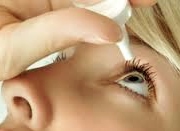Eye Herpes – What is It?

While most people know that herpes is an infectious virus that presents itself in the form of cold sores (HSV1), and genital blisters (HSV2), many people are unaware that herpes can present itself in the eyes as well. Herpes of the eye is caused by HSV1, and its medical term is herpes simplex keratitis. Herpetic eye disease is not sexually transmitted, and the symptoms of the disease often mimic other eye issues.
Eye Herpes Causes and Symptoms
Herpetic eye disease is caused by the virus multiplying within the body and making its way into the sensitive area of the eye. Symptoms vary in severity, and often times herpetic eye disease outbreaks occur when the immune system is weakened by a virus or infection. One of the most common symptoms of herpetic eye disease is pain. The pain is typically around one eye, and it is usually quite severe due to the fact that the virus surrounds the nerves. Eye pain can often mimic sinus pain or the onset of a migraine headache, so it is common for people to attempt to treat this symptom with medication. Another common symptom is a red rash around the eye and on the eyelid. Once again, this symptom can mimic that of an allergic reaction, and sufferers may attempt to treat this issue with antihistamines. The rash also mimics a common illness called shingles, an extension of the chicken pox virus often brought on by stress or a weakened immune system. Additional symptoms include cloudy vision and eye redness, a feeling of grit or sand in the eye, and sensitivity to light.
Treatment and Outcome
In order to diagnose herpetic eye disease, the doctor will perform a variety of tests in order to rule out allergies, pink eye, or shingles. Once the disease is properly diagnosed, it is treated with antiviral medications due to the fact that antibiotics will not cure a virus. The antiviral medications are prescribed in drops, and if there is an infection in the corneal area as well, it is possible that the doctor will prescribe corticosteroids to minimize inflammation. It is extremely important for patients to continue their medication, even if their eyes begin to feel and look better, as the infection can remain in the system for an extended period of time.
With prompt and proper treatment, the prognosis for herpetic eye disease is quite good. While there is no way to avoid the infection, individuals who suffer from cold sores can minimize their risk of developing herpetic eye disease by doing their best to stay healthy. Taking a multi-vitamin on a daily basis can help to keep the immune system on full alert, and avoiding stress can help to minimize cold sore breakouts. Eating a healthy diet and getting adequate rest are also beneficial to the immune system and an individual’s overall health and wellness. By taking some steps to stay healthy and seeking treatment at the first sign of symptoms, sufferers can expect a full recovery from herpetic eye disease.






